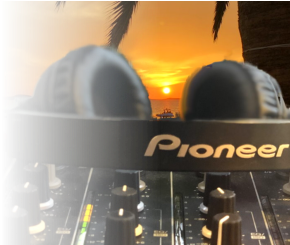
House
Deep House
ORGANIC House
Chillout
80s & 90s Pop & Club Classics
Get the
I B I Z A
feeling

DJ OF 69 Glossary
**Beatmatching**
The fundamental technique of synchronizing two tracks to the same tempo and
phase. This is a core skill for DJs to create seamless transitions.
**BPM (Beats Per Minute)**
The unit of measurement for a track's tempo. DJs use this to mix tracks with similar
speeds.
**Booking**
The process of engaging DJs for performances in clubs, at festivals, or other events.
Successful bookings often depend on the DJ's reputation, music selection, and
ability to energize the crowd.
**Club**
A venue that specializes in electronic dance music. Clubs are often the home for DJs
who regularly perform there and build their fanbase.
**Cue**
The point at which a track is set to start. DJs set cue points to enable precise
entries.
**Deep House**
A subgenre of house music characterized by deep basslines, complex melodies, and
often jazzy or soulful influences. Deep house creates a relaxed yet groovy
atmosphere.
**Drop**
The climax of a track, often marked by the introduction of the full beat and bassline.
DJs use the drop to increase energy on the dance floor.
**DVS (Digital Vinyl System)**
Allows control of digital music using timecode vinyl on traditional turntables.
**EDM (Electronic Dance Music)**
An umbrella term for various genres of electronic dance music, often used in more
commercial contexts.
**EQ (Equalizer)**
Allows adjustment of different frequency ranges (highs, mids, lows) of a track.
Important for mixing and sound shaping.
**Festival**
A larger music event that typically spans several days and features various DJs and
artists. Festivals provide DJs the opportunity to perform in front of a large and
diverse audience.
**Furious**
An energetic music style characterized by fast beats and intense rhythms. Furious
sets can electrify the dance floor.
**Harmonic Mixing**
The practice of mixing tracks based on their musical key to create harmonious
transitions.
**House**
A fundamental genre of electronic dance music, characterized by a 4/4 beat and
often incorporating elements from disco, soul, and funk.
**Loop**
A repeating section of a track. DJs use loops to extend transitions or create rhythmic
effects.
**MIDI (Musical Instrument Digital Interface)**
A standard protocol that enables communication between electronic musical
instruments and computers.
**Mix**
A compilation of various tracks that a DJ seamlessly transitions between. A good mix
tells a musical story and keeps the energy on the dance floor alive.
**Organic House**
A fusion of deep house and organic, often acoustic sounds. This style is defined by
natural instruments and samples combined with electronic beats.
**Quantize**
A function in DJ software that automatically aligns beats and loops to a rhythmic
grid.
**Remix**
A new version of an existing track, often featuring new elements or altered
arrangement.
**Sampling**
The use of a portion of an existing track in a new context. Fundamental to many
electronic music genres.
**Techno**
A genre of electronic music characterized by repetitive rhythmic structures and
synthetic sounds.
**Vinyl**
Records traditionally used by DJs for spinning. Playing with vinyl requires special
skills and is often regarded as the "true" art of DJing.


DJ OF 69 Glossary
**Beatmatching**
The fundamental technique of synchronizing two tracks to the same tempo and
phase. This is a core skill for DJs to create seamless transitions.
**BPM (Beats Per Minute)**
The unit of measurement for a track's tempo. DJs use this to mix tracks with similar
speeds.
**Booking**
The process of engaging DJs for performances in clubs, at festivals, or other events.
Successful bookings often depend on the DJ's reputation, music selection, and
ability to energize the crowd.
**Club**
A venue that specializes in electronic dance music. Clubs are often the home for DJs
who regularly perform there and build their fanbase.
**Cue**
The point at which a track is set to start. DJs set cue points to enable precise
entries.
**Deep House**
A subgenre of house music characterized by deep basslines, complex melodies, and
often jazzy or soulful influences. Deep house creates a relaxed yet groovy
atmosphere.
**Drop**
The climax of a track, often marked by the introduction of the full beat and bassline.
DJs use the drop to increase energy on the dance floor.
**DVS (Digital Vinyl System)**
Allows control of digital music using timecode vinyl on traditional turntables.
**EDM (Electronic Dance Music)**
An umbrella term for various genres of electronic dance music, often used in more
commercial contexts.
**EQ (Equalizer)**
Allows adjustment of different frequency ranges (highs, mids, lows) of a track.
Important for mixing and sound shaping.
**Festival**
A larger music event that typically spans several days and features various DJs and
artists. Festivals provide DJs the opportunity to perform in front of a large and
diverse audience.
**Furious**
An energetic music style characterized by fast beats and intense rhythms. Furious
sets can electrify the dance floor.
**Harmonic Mixing**
The practice of mixing tracks based on their musical key to create harmonious
transitions.
**House**
A fundamental genre of electronic dance music, characterized by a 4/4 beat and
often incorporating elements from disco, soul, and funk.
**Loop**
A repeating section of a track. DJs use loops to extend transitions or create rhythmic
effects.
**MIDI (Musical Instrument Digital Interface)**
A standard protocol that enables communication between electronic musical
instruments and computers.
**Mix**
A compilation of various tracks that a DJ seamlessly transitions between. A good mix
tells a musical story and keeps the energy on the dance floor alive.
**Organic House**
A fusion of deep house and organic, often acoustic sounds. This style is defined by
natural instruments and samples combined with electronic beats.
**Quantize**
A function in DJ software that automatically aligns beats and loops to a rhythmic
grid.
**Remix**
A new version of an existing track, often featuring new elements or altered
arrangement.
**Sampling**
The use of a portion of an existing track in a new context. Fundamental to many
electronic music genres.
**Techno**
A genre of electronic music characterized by repetitive rhythmic structures and
synthetic sounds.
**Vinyl**
Records traditionally used by DJs for spinning. Playing with vinyl requires special
skills and is often regarded as the "true" art of DJing.

